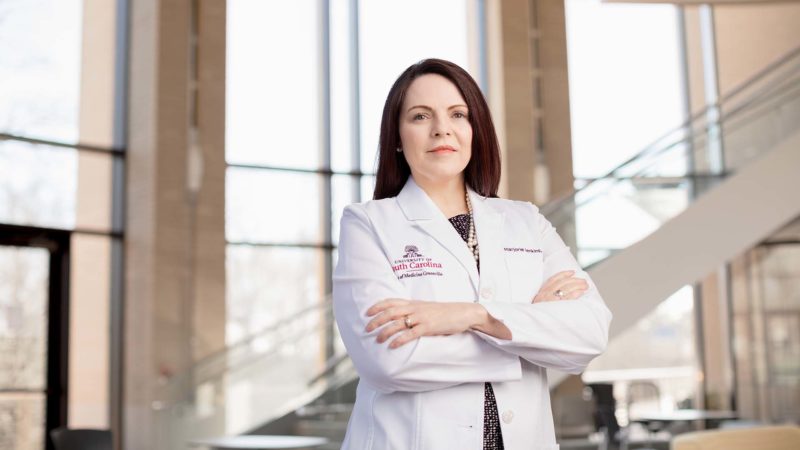By Dr. Marjorie Jenkins
Dean, USC School of Medicine Greenville
You’ve heard it a thousand times. Exercise. Eat healthier. Lose weight.
As dean of the University of South Carolina School of Medicine Greenville, I know this is critical advice to tackling heart disease, obesity and other chronic disease, which is the leading cause of death and disability in our community and across the nation.
I also believe medical schools can, and must, do more to equip doctors with the knowledge and expertise focused on wellness and self care to improve patient health. A healthy diet, regular exercise and managing stress are all goals you may aspire to. When prescribed by a doctor trained in lifestyle medicine, healthy behavior modifications like these can help treat or prevent diseases.
The American Hospital Association estimates 133 million Americans – nearly half the population – suffer from at least one chronic illness. Heart disease affects more than 79 million Americans and is responsible for 40% of all deaths. During the past 15 years, the number of people with diabetes has more than doubled. Obesity rates are rising for both adults (42.4%) and children (19.3%), according to the American Hospital Association.
According to the Centers for Disease Control and Prevention, chronic disease is the leading cause of death and disability. The National Institutes of Health report that 80% of these conditions are preventable through lifestyle choices or early detection and management of risk factors.
At School of Medicine Greenville, we lead an approach to health known as “lifestyle medicine” in which future doctors are trained to become partners with their patients in finding ways to improve diet, reduce stress, improve exercise habits and capitalize on the healing properties of food as medicine.
This evolution of care is an important tool to stem the long-term increase in chronic conditions and their high costs because it focuses on patients’ daily behaviors and builds strong doctor-patient relationships. The University of South Carolina School of Medicine Greenville is the first medical school in the country to fully incorporate education in nutrition, physical activity and healthy behaviors into all four years of the medical school curriculum.
From day one, our students cover the six pillars of lifestyle medicine: eating healthy, exercising, managing stress, building healthy relationships, developing quality sleep habits and avoiding substance abuse. We’ve incorporated 100 hours of lifestyle medicine into our curriculum.
In 2022, School of Medicine Greenville participated in the White House Conference on Hunger, Nutrition and Health, which presented a pioneering vision for ending hunger and reducing diet-related disease by 2030. The school committed a $4.8 million in-kind donation to help implement its open-source lifestyle-medicine curriculum in all interested medical schools.
In January, Dr. Jennifer Trilk, a nationally recognized expert and director of lifestyle medicine programs at School of Medicine Greenville, served as a panelist at the U.S. Department of Health and Human Services’ Food is Medicine Summit. Trilk founded the program at the school in 2012, growing it from four hours during pre-clinical years to more than 100 hours of required lifestyle-medicine curriculum across all four years. She has also created a “classroom-clinic-community” model by partnering with Greenville Technical College and the YMCA of Greenville to provide programs that educate the students with the goal of creating a healthy Greenville community.
And in April, School of Medicine Greenville became one of the first two schools in the nation awarded a Platinum Plus certification from the American College of Lifestyle Medicine in the Undergraduate Medical Education Lifestyle Medicine Curriculum Certification process.
Our free monthly “Walk with a Future Doc” event encourages lifestyle medicine within the community. Medical students discuss a health topic, then spend the rest of the hour walking and sharing conversations. It’s a fun and safe way to go for a walk, learn about health and meet new friends.
While awareness of lifestyle medicine has grown exponentially during the past two to three years, physicians and medical students often receive limited training in this approach, leaving some providers lacking the skills or confidence to adequately counsel their patients in behavioral modifications.
The American Heart Association reports that although physicians are uniquely positioned to encourage individuals to adopt healthy behaviors, lifestyle counseling does not routinely occur with their patients. This lost opportunity is attributed to a number of factors including lack of time, reimbursement processes that incentivize treatment over prevention, and limited knowledge or competencies to perform lifestyle counseling effectively.
As awareness grows for how lifestyle factors such as nutrition and exercise contribute to chronic disease prevention, medical schools are increasingly weaving principles that focus on healthy behaviors into their core curriculums. But we need to do it faster.
The traditional medical school curriculum does not include adequate instruction to educate future physicians on the importance of lifestyle for their patients’ health, especially when compared with time devoted to pharmacological treatment.
If we don’t train our future doctors how to work with patients to prevent these illnesses, the health care costs of our nation, as well the morbidity and mortality related to chronic diseases, will continue to skyrocket.
Lifestyle medicine is a lifelong solution to living longer, healthier and happier lives. We must encourage one another to live better and to make slight changes to our routines, each of which compounds to make a profound difference.
With increased focus on lifestyle medicine, we can improve the health of millions of Americans starting right here in our own community.
Marjorie Jenkins (M.D. MEdHP, FACP) serves as dean of the University of South Carolina Medicine Greenville and chief academic officer for Prisma Health Upstate.












